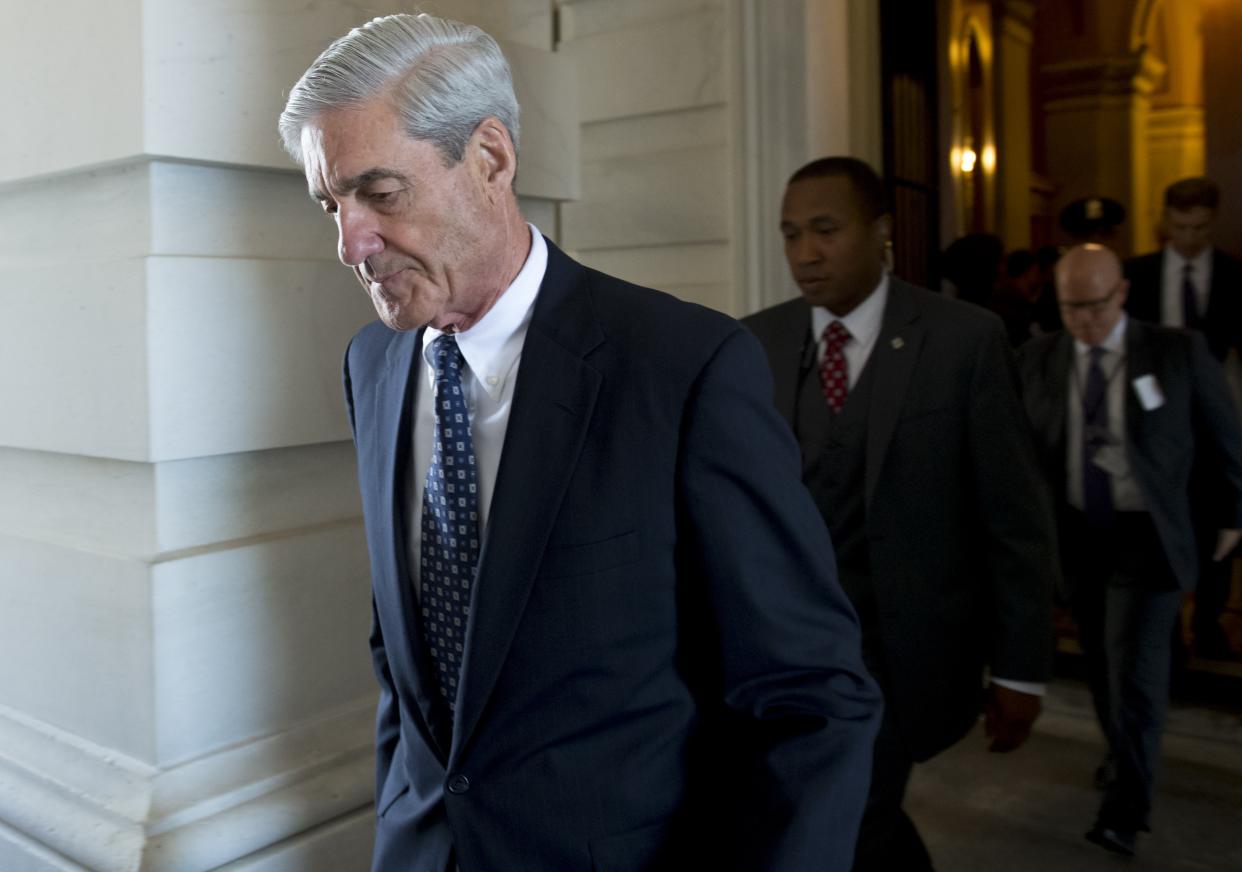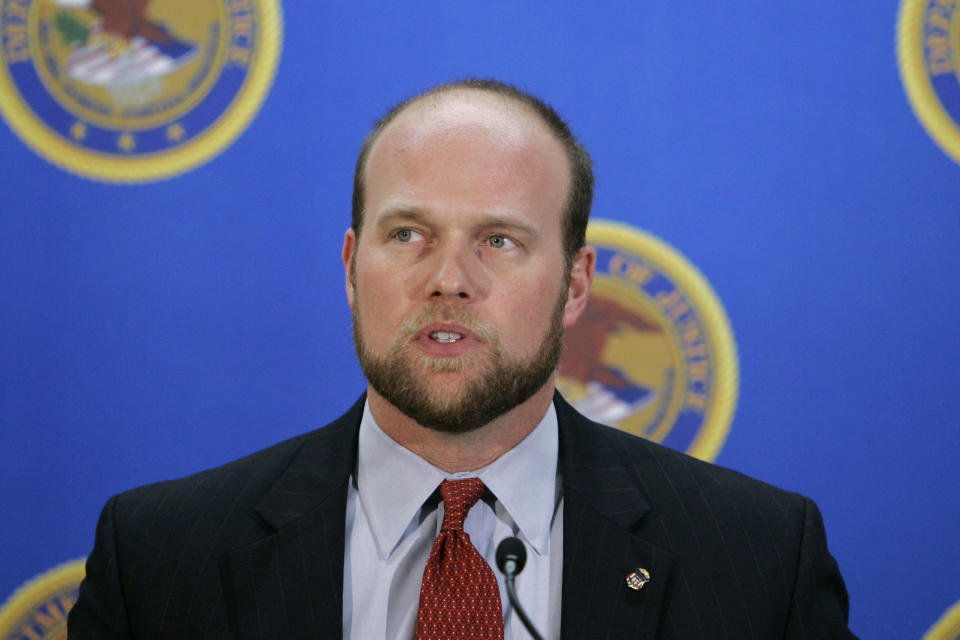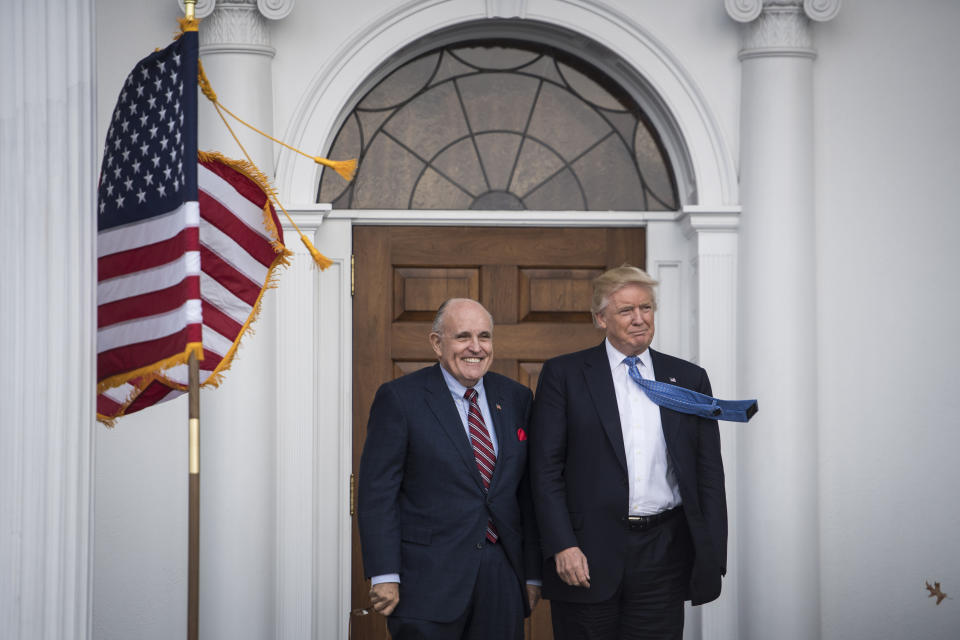Is a Mueller report coming? Not necessarily.

After Wednesday’s abrupt post-election firing of Attorney General Jeff Sessions, there are mounting questions about the legal landscape surrounding President Trump and special counsel Robert Mueller’s investigation into Russian interference in the 2016 presidential election.
Many observers and experts expect the probe could conclude with a report by Mueller and both the timing and contents of that document have become sources of intense speculation.
The belief that Mueller will issue a report stems from the widely held view in the Department of Justice and the broader legal community that the indictment of a president in office is unconstitutional. A memorandum on the subject prepared by the Justice Department’s Office of Legal Counsel in 2000 flatly declared, “the indictment or criminal prosecution of a sitting president would unconstitutionally undermine the capacity of the executive branch to perform its constitutionally assigned functions.” This consensus opinion, however, is not unanimous; a memorandum prepared by Kenneth Starr’s independent counsel investigation in the 1990s took the opposite view.
Nevertheless, conventional wisdom holds that Mueller, a committed institutionalist, would not buck the consensus and indict President Trump. Accordingly, Mueller is expected to report any findings he makes about the president’s personal culpability to Congress, rather than seeking an indictment. That would allow Congress to review the information and, potentially, consider whether to initiate impeachment proceedings.
In delivering such a report, Mueller could follow the precedent of the Watergate special counsel Leon Jaworski, who delivered a 53-page grand jury presentment to Congress after seeking approval to do so from the judge overseeing the grand jury. This report, which is known as the Watergate “road map,” was only publicly revealed by a federal court last month after decades of secrecy following a petition from a group of legal scholars. Jaworski’s road map laid out the allegations against President Richard Nixon in spare, declaratory sentences.
Alternatively, Mueller’s special counsel team could try to follow the more public route of Starr’s independent counsel investigation into President Bill Clinton, which prepared a lengthy, excruciatingly detailed narrative report to Congress. Republicans, who controlled both houses of Congress at the time, voted to make the Starr Report public on the internet shortly after it was delivered. It was quickly put into book form by three different publishers and rapidly shot to the top spots on the bestseller list.
This approach would face practical challenges for Mueller. The special counsel’s Trump-appointed supervisors at the Justice Department may not look kindly on a splashy report, and Republicans, who are less than eager to spread derogatory information about Trump, will control both chambers of Congress until a Democratic House is seated in January.
The assumptions about Mueller’s reluctance to directly indict Trump coupled with the Jaworski and Starr precedents have left the press eagerly tracking rumors of one or more reports from the special counsel’s Russia probe. A Washington Post story in April of this year, for instance, said Mueller had “told Trump’s lawyers” that he is “preparing a report about the president’s actions while in office and potential obstruction of justice.” A New York Times story in May, which was based on claims made by former New York City mayor Rudy Giuliani, Trump’s legal spokesman, reported that he hoped to complete his obstruction inquiry by Sept. 1.
Despite this feverish anticipation of a Mueller report, much remains uncertain. The stories about the famously tight-lipped special counsel’s plans all appear to be second-hand tales, and may be colored by Trump’s attorneys misunderstandings, strategic spin or deception. Moreover, the Mueller probe operates under a different legal framework than either the Jaworski or Starr investigations. Mueller is governed by a set of federal regulations developed in 1999, after the independent counsel law under which Starr operated was permitted to expire.
Those regulations provide that, at the end of Mueller’s work, he will give the attorney general “a confidential report explaining [his] prosecution or declination decisions.” The attorney general then controls whether this “confidential report” would be made public or included in the attorney general’s own required reports to the congressional judiciary committees.
That delivery mechanism relies on the attorney general’s discretion and is far different from the Jaworski or Starr examples. Jaworski had his grand jury bless his “road map” and then sought a judge’s approval to take it to Congress. Starr, under the auspices of the older independent counsel law, sent his work directly to Capitol Hill.
In the current case, the release of any report would depend on Sessions’s successor. Trump has for now replaced Sessions with his former chief of staff, Matthew Whitaker, who has previously suggested he believes the Mueller probe has gone too far. In an op-ed written for CNN last year, Whitaker said the Department of Justice should put limits on the Mueller probe to stop it from becoming a “political fishing expedition.” Whitaker also has close ties to a key figure who has attracted Mueller’s attention.
Whitaker, a man widely viewed as a Trump loyalist, may be disinclined to publicize derogatory information or share more than the bare minimum with Congress.

If Mueller wishes to conduct an end run around the attorney general and present a report to Congress on his own, he might choose to follow the Jaworski model of having a grand jury file a presentment with a court and seek that court’s authorization to send the presentment on to Congress. That tactic isn’t required or forbidden by the current special counsel regulations.
However, it’s possible that Mueller will follow a different example entirely. He could adopt the strategy used in a previous high-profile special counsel investigation: the Bush-era probe into the leak of CIA official Valerie Plame’s name and clandestine status. That investigation, which was led by Mueller’s close friend Patrick Fitzgerald, did not rely on reports to communicate information to Congress or the public. Instead, recognizing that the regulations he operated under called for no public reports, Fitzgerald spoke only through indictments and prosecutions.
Fitzgerald’s public explanation of what his investigation found came almost entirely through the indictment and trial of Lewis Libby, Dick Cheney’s chief of staff.
“I think people learned a fair amount about what we did,” Fitzgerald said, in later congressional testimony. “They didn’t learn everything. But if you’re talking about a public report, that was not provided for, and I actually believe and I’ve said it before, I think that’s appropriate.”
There’s a possibility Robert Mueller agrees with Fitzgerald’s approach, and will continue to speak publicly only in indictments and trial materials. If so, the big question will be whether one or more of those indictments names the occupant of the Oval Office as an unindicted co-conspirator.
The bigger question may be whether Trump even allows the Mueller investigation to continue at all. It is unclear whether Whitaker will recuse himself as Sessions did. However, given his past comments and personal ties, there has been rampant speculation that Whitaker could curtail Mueller’s investigation. High-ranking former Justice Department officials and other commentators have raised doubts about the constitutionality of Trump’s appointment of Whitaker. Those doubts could form the substance of legal challenge to the validity of any moves Whitaker might make to curtail the investigation.
Whitaker did not respond to a request for comment.

In recent days, as focus on the future of the probe mounts, there have been rumors swirling about the fate of one of the most prominent legal minds working for Trump, Rudy Giuliani.
While Giuliani’s profile has seemingly diminished of late, those close to the president’s legal team denied the ex-mayor had been relieved of duty.
“It’s fundamentally not true. He’s fully engaged as a member of the legal team and plays a very key role,” one person familiar with the situation who requested anonymity to discuss internal deliberations said.
However, a separate source familiar with the situation said Trump was unhappy with Giuliani’s handling of written questions the president’s attorneys received from Mueller and his associates.
Giuliani did not respond to multiple requests for comment on this story.
Thus far, Trump’s legal team has been working with Mueller. A source familiar with the deliberations of the president’s attorney’s indicated they didn’t expect Trump would do anything to quash the probe.
According to the source, Trump’s attorneys are “proceeding ahead” as they have been and sticking with the strategy of working with Mueller and his prosecutors.
_____
Read more from Yahoo News:
The CIA’s communications suffered a catastrophic compromise. It started in Iran.
Ending the Qatar blockade might be the price Saudi Arabia pays for Khashoggi’s murder
How Robert Mercer’s hedge fund profits from Trump’s hard-line immigration stance
Trump’s target audience for migrant caravan scare tactics: Women



